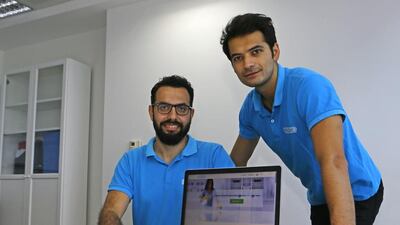The UAE app market is coming into its own, but many app developers still choose to send their business offshore, particularly in the start-up world.
One such business is Justmop.com, a two-year-old cleaning service marketplace founded by Turks Ali Ozcan and Kerem Kuyucu, who used developers in Turkey to build their site and app.
“In Turkey, living expenses are a quarter or a third of those in the UAE, so we can hire two to three people with the same qualifications,” says Mr Ozcan, who says Justmop.com has a five-strong technology team in Turkey and nine other staff in the UAE.
He admits that there are many ways to transform an “everyday need” into a product and a business, and having a development team outside the UAE, can risk transforming that need into technology in an “efficient way”.
The International Data Corporation estimates that there will be 210 billion mobile application installations by 2020, while time spent in apps grew by more than 20 per cent worldwide to about 900 billion hours last year, according to a report by US business intelligence firm App Annie. An Accenture report showed that digital entrepreneurs and technology start-ups could add US$14 billion to the UAE’s GDP and $1.5 trillion globally by 2020.
Louis Lebbos, founding partner of AstroLabs, a co-working space for technology companies in Dubai, says many apps are being developed by local entrepreneurs – yet “a lot of the actual software development is happening offshore”.
“We don’t have actual statistics but, from my interactions with entrepreneurs, I would estimate 70 to 80 per cent is happening in other countries – traditional outsourcing locations such as India, Pakistan and eastern Europe but also in Mena countries such as Egypt, Lebanon, Jordan and Tunisia.
“We don’t have a tonne of developers in-country, both because there are not enough computer science graduates to start with, but also because of the high cost of living in the UAE.”
Mr Ozcan came up with the idea for Justmop.com when he moved to the UAE in 2013 to work at first Foodonclick.com and then Sellanycar.com. “When I got married and my wife was coming here, I was looking for a good maid company. My wife is super-picky,” he says. He and Mr Kuyucu built a basic product in six weeks and a hybrid mobile app in five months; they are now working on native Android and iPhone apps.
Users book regular or one-off cleanings lasting two to eight hours starting at Dh35 an hour then rate their cleaner, which helps with the “matchmaking”. Cleaning companies pay a commission to Justmop.com once the clean is completed, and also pay for the software.
There is a “lifestyle evolution” thanks to businesses such as Justmop.com, in which “errands are transforming into services with the help of mobile apps”, says Fahad Al Bannai, the chief executive of Axiom Telecom. This is creating a “fertile ground” for the country’s digital innovators. “Many are reaping the benefits and many more will follow,” he says.
But Joy Ajlouny, the co-founder of the delivery app Fetchr, disagrees. While Fetchr was first built in Dubai, it now also has technology offices in Nigeria, Jordan and India.
“There is little locally sourceable talent,” says Ms Ajlouny. She says this will change as businesses like Fetchr grow, as they will “require talent to be based together within a certain location”.
Rami Shaar, the founder and chief executive of the laundry app Washmen, says: “The pool of good developers is going after the big cities – in the US, Berlin, London – and Dubai hasn’t made it onto the map yet. It is a hotbed of need but a disaster when it comes to talent.”
He believes one problem is that there have not yet been enough exits of start-ups. That means the equity shares usually offered to employees by start-ups that cannot afford high salaries is not enticing enough for international technology whizz kids.
Washmen did, however, hire its chief technology officer in the UAE. “I wanted to keep it close to home,” says Mr Shaar. “Engineering is core so, even when I was on zero or a low salary for the first year, I paid my engineer a full salary. It’s an investment.” All staff, including developers, also do a day a month “in the field”, so they can bring their real-life experiences into the product.
It was the same for the food ordering business Talabat which, while now owned by Berlin-based Delivery Hero, started out in Kuwait and services the GCC and Jordan. It built up all its teams at home in Kuwait, including its 40-strong IT and technology team. They now have a wider team to lean on in Berlin.
Mr Ozcan says start-ups should at least have a “component” of their technology team locally, such as putting a product manager on the ground. “If you don’t observe the daily challenges, you cannot translate them into the right solution,” he says.
business@thenational.ae
Follow The National's Business section on Twitter

